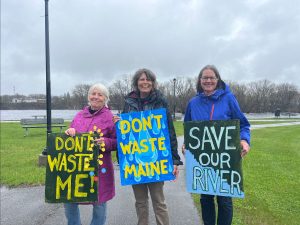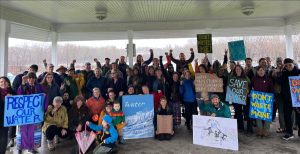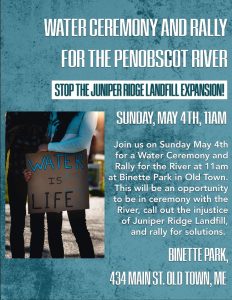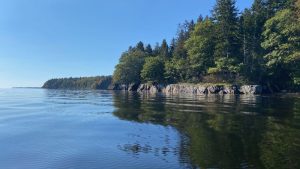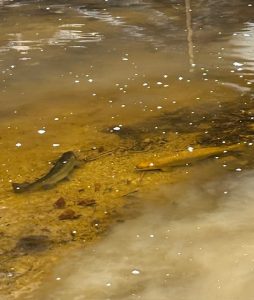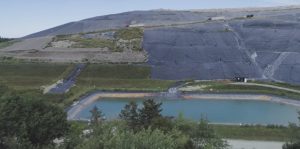Listen to Radio Broadcast
https://archives.weru.org/radioactive/2024/01/radioactive-1-23-24-juniper-ridge-landfill-contract-extension-sought/
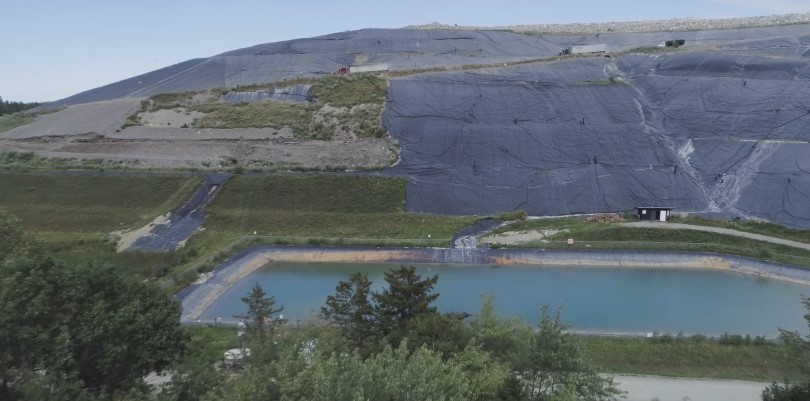
Casella Waste Systems, the private operator of the state owned Juniper Ridge Landfill in Old Town, is seeking a six year extension of their state contract while they apply for a 40% expansion of the current landfill.
For over two decades, area residents, including the Penobscot Nation, have continued to shine a light on harmful environmental impacts from the landfill, including on the Penobscot River, and questioned the for-profit model that has increased the importation of out-of-state waste, straining landfill capacity.
The State of Maine Department of Administrative and Financial Services Bureau of General Services will hold a public hearing regarding changes to its Operating Services Agreement (OSA) with Casella to allow a contract extension on Thursday February 15th from 6-8pm, in Brewer, at Jeff’s Catering.
There is not currently a plan for the Bureau to stream the event, but if that changes they will issue a notice and post on their website. Sunlight Media Collective plans to stream on Facebook Live.
Written comments can be submitted to the Bureau of General Services by Monday February 26th, at 5pm.
Submission by email: [email protected]
Submission by mail:
Lane Gould, Landfill Manager
Bureau of General Services
111 Sewall St. Cross Office Building 4th floor
77 State House Station Augusta, ME 04333-0077
Listen to RadioActive 1/23/24 program on WERU FM co-produced with Sunlight Media Collective:
With guests Maria Girouard, Nickie Sekera and Ed Spencerhttps://archives.weru.org/radioactive/2024/01/radioactive-1-23-24-juniper-ridge-landfill-contract-extension-sought/
Transcript of the radio program below.

| Transcript : This is RadioActive, a grassroots environmental and social justice news journal, for Tuesday, January 23rd, 2024. This is Meredith DeFrancesco with Dawn Neptune Adams. Today’s edition is produced with Sunlight Media Collective. Today — Casella Waste Systems, the private operators of the state owned Juniper Ridge Landfill in Old Town is seeking an extension of their state contract, despite a record of harm to the local environment and communities, including the Penobscot Nation. The State of Maine Department of Administrative and Financial Services Bureau of General Services will hold a public hearing regarding changes to its Operating Services Agreement (OSA) between the State and private company, Casella Waste Systems, which operates the state owned Juniper Ridge Landfill in Old Town. A public hearing slated for January was postponed. The new date is Thursday February 15th, from 6-8pm, in Brewer, at Jeff’s Catering. Written comments can be submitted to the Bureau of General Services by Monday February 26th, at 5pm In its public notice, the Bureau states that it expects to extend the Operating Services Agreement an additional six years from February 5th, 2034 to February 5th, 2040, because of Casella’s proposed expansion of Juniper Ridge Landfill. Over the past two decades, area residents, including the Penobscot Nation, have continued to shine a light on harmful environmental impacts from the landfill and questioned the for-profit model that has increased the importation of out-of-state waste, straining landfill capacity, while minimizing recycling efforts. Leachate from the landfill is currently processed at the paper mill in Old Town, then dumped into the Penobscot River directly below the Penobscot Nation, who have expressed concern for fish and human health impacts from effluent chemicals, including PFAS. This past May, the landfill itself caught on fire and burned for a number of hours, sending plumes of smoke into the air. Local residents and others oppose the proposed expansion of the Juniper Ridge Landfill, the reason given for the state’s consideration of extending Casella’s Juniper Ridge contract. They call for an evaluation of Casella’s performance before there is an extension of their contract, that an extension not be granted until an expansion license could be granted, and that an expansion application should consider disposal capacity for in-state waste and include the observation of Environmental Justice, which is now required in statute in the public benefit determination. A landmark measure was passed by the legislature in 2022 restricting the importation of out of state waste, but was postponed for two years this past May, after Casella Waste Systems claimed the restrictions on out of state waste affected their ability to stabilize the landfills liquid sludge. Today’s guests, to discuss the details of these concerns, are Ed Spencer with the local grassroots watchdog network Don’t Waste ME, which has been involved for the past two decades in opposing Juniper Ridge landfill’s pollution, importation of out-of-state waste and business practices through grassroots organizing legislation and engaging as legal intervenor in a number of proceedings. Ed lives in close proximity to the Juniper Ridge Landfill. We’re also joined by Nickie Sekera, founder and organizer with Community Water Justice and a contributing member of Sunlight Media Collective. She also has recently been appointed to the Commission To Study the Role of Water as a Resource in the State of Maine. She grew up in Eddington. And we have with us Maria Girouard from the Penobscot Nation. She’s a Penobscot Nation Tribal Council member, though is not formerly representing the Nation today. She’s a grassroots environmental organizer with Dawnland Environmental Defense and founder of Sunlight Media Collective. She’s writer and director of the documentary, “The Penobscot: Ancestral River Contested Territory.” Can you all give some general perspective on your concerns about Juniper Ridge Landfill’s impact on the environment, in your communities, and the business model that Casella is operating under? Ed, let’s start with you. Ed Spencer, Don’t Waste ME: Juniper Ridge Landfill has been a real nuisance as a neighbor and not just a nuisance, but a threat to our health. Primarily at this juncture in the form of landfill gases escaping the facility. These can run from annoying rotten egg smells to gases that make one gasp and just fearful for your safety. So I think it might be helpful to discuss how this arrangement between the state and Casella came about. In 2003, there was a crisis of sorts, and the paper mill at that time in Old Town wanted to get rid of its landfill. They saw it as a liability. And the state had been looking for landfill capacity under the fairly recent state mandate at that point that any future landfills in Maine be publicly owned. And Casella was in the development stages of this three-way deal : Casella, the paper mill and the state of Maine. And when they brought it out of the shadows, where the deal had already been done, to the public…and there was never an actual formal public hearing, there was some what they call public information sessions. And they repeatedly would promise that there’ll be no out-of-state waste in here, and there’ll be no curbside waste into this landfill the state was going to own. And right off the bat, the state lied because they had actually made this deal where Casella was going to provide the mill with fuel to burn in a boiler that was supposed to lower their energy costs. And this fuel was supposed to come from Construction Demolition Debris. Well, nobody knew at the time, but at the same exact time these officials are saying there’ll be no out-state waste, the State Planning Office, who was the original owner of the landfill for the state, they had made this arrangement whereby Casella could bring in enough debris from out of state to drive the fuel from, and then the residues from that processing could come to the state landfill, even though they had originated out of state. So that was 2003, 2004, the Operating Services Agreement (OSA) was signed with Casella. They had.. the year before there, Casella had assumed they were going to be the operator. Well, someone in the state government said, well, we should really put out a request for proposals. We can’t just give it to Casella. So they developed these RFP and then it turned out Casella was the only entity that bid on it. So they awarded it to Casella, and after Casella became operator, then they refused to comply with all the requirements in the RFP, but the state let it slide anyhow. Specifically, there was supposed to be a $50 million performance bond posted by whoever would be the operator. Casella never did that. They ended up posting a $3 million bond. So anyways, now they sign it February of 2004. And these waste imports were specifically tied to fuel for the Old Town mill only. Well, some years went by, and about late 2007 into 2008, Harry Sanborn and Chuck Leithiser did a graph and they were looking at the reports on what was coming into Juniper Ridge and they noticed that there was all this residual from the fuel for the Old Town mill. And they said, well, they’re not using any fuel down there. They’re not burning any fuel. How come all this out of state waste is coming in here? So we kind of took turns asking questions at city council meetings -Chuck Mary Dolan, myself, others. And it turned out our city manager said, “oh, they’ve changed the agreement”. We said, “what agreement?” “Oh, the Operating Services Agreement. It was changed.” So we started looking into this and sure enough found out that they had changed. They had made amendments, the second amendments to the OSA that were extremely favorable to Casella. And in doing this, they neglected to notify any of the other parties. So SPO signed these agreements on behalf of the state with Casella. Neither of them told the city of Old Town, the town of Alton, Penobscot Nation, the Juniper Ridge Landfill Advisory Committee, or the DEP, who is the regulator of Juniper Ridge. They were just kept in the dark. So we called them “the Secret Amendments.” Anyway, there was some contentious meetings, and out of that came legislation (I think through Bob Duchesne who was a local Rep at that point), that if the OSA was ever changed, then they had to hold a public hearing. So that’s why, I believe, this is happening this Thursday [note: meeting is now scheduled for Wednesday February 14th]. It’s not because the BGS, the state, wants to really talk about plans for the landfill and share good ideas and the necessity of this. That may happen. But the real reason for it, I think, is because they have to by law and I doubt they would be doing it if it wasn’t required. So that’s why, with that as the background, we think there should be a review before there’s any extension of this agreement. We are 20 years in to that 30 year contract between the state and Casella. There’s never been any official review. During this period of time, the state as owner, which started out being the SPO and is now BGS, has never once contradicted or reprimanded Casella about any of their activities or changes to be made at the landfill. Even though there’s this inherent conflict between Casella, which is a publicly traded corporation that does business from as far south as Maryland to Pennsylvania on up through all of New England, New York State, and Maine. So they’re profit driven. Handling more waste equals making more money to them. Whereas the State, as owner, is caretaking, should be, this resource for the state, for the people of the state of Maine. So Casella’s business partners have been very well taken care of in this. A whole lot of waste has been brought into Maine, and it’s just been all a one way street. And the state never once said, we think you should be preserving this a little better. It is hard to expand this, we don’t want to do it. What about pressing them to control the odors? Or, also of extreme importance: How about doing a better job treating this leachate, which we know is full of PFAS, heavy metals, all kinds of toxic compounds, and it’s basically being dumped into the Penobscot River with very minimal treatment. So treatment, it seems like that should be a concern for whoever owns this thing, which is our own State of Maine. RadioActive: Again, Ed Spencer with the local watchdog network, Don’t Waste ME. You are listening to Radioactive Grassroots Environmental and Social Justice News Journal on WERU 89.9 FM. Today we’re talking about the state owned privately operated Juniper Ridge Landfill in Old Town. Operator, Casella Waste Systems is seeking the extension of their state contract while pursuing the landfill’s expansion. A public hearing on this extension will be held Thursday, February 15th at 6pm at Jeff’s Catering in Brewer. Maria Girouard is from the Penobscot Nation and is a Penobscot Nation Tribal Council member, though not formally representing the Nation today. She’s a grassroots environmental organizer, and writer and director of the documentary, “The Penobscot: Ancestral River Contested Territory.” This seems like a really good time to bring in you Maria Girouard for your reflections on Juniper Ridge Landfill and its impacts on the community and your current concerns. Maria Girouard: Thank you and thank you Ed, for laying out the history so well. As Ed mentioned, this has been a couple of decades, and the more we expand the landfill, the more we are in danger of further desecrating and exploiting the Penobscot River Watershed. And there’s this old expression that says, “Don’t let the camel’s nose into the tent.” And it’s meant to warn that if you let a camel’s nose into the tent, then nobody can prevent it from entering inside and devouring or doing whatever it wants within the tent. And so Juniper Ridge Landfill is the perfect example of how this has been allowed to happen for two decades now. And an important note is that the state of Maine is the owners of this landfill. And so every person in the state of Maine should be concerned as stakeholders in what is happening at Juniper Ridge Landfill. I know so often in discussions like these, there’s a lot of “not in my backyard,” and there’s also a lot of thinking from people who live far away from the landfill that the impact is contained to a certain area. But water is water, and water knows no boundaries. And the fact that Juniper Ridge Landfill has been involved in dumping leachate into the Penobscot River for a number of years, we’ve now learned about the concerns and the impacts of the PFAS and how that is impacting how we grow food, how we can hunt, and how we can fish. We have had the fire at Juniper Ridge Landfill last spring. And so many neighbors, and of course people from Penobscot Nation, who are in such close proximity to Juniper Ridge Landfill, were concerned about the toxicity in the air, the toxicity in the ashes that were falling into the river, that were falling into their backyards, that were falling into their garden spaces, all over Penobscot Nation land. Penobscot Nation owns approximately half the land in Argyle Township. And the location of Juniper Ridge, setting in between two streams, Pushaw Stream and Birch Stream. It’s located in a wetland. And now with this current request, Juniper Ridge is looking to expand 40% of the current footprint. That’s enormous. And if you look at a map and you see where it’s located between these two streams…And just the name itself, Juniper Ridge, I mean Juniper’s grow in wetlands…you have to really question the impact to future generations. And one thing that we learned along the way, is that landfills, they’re all going to leak at some time or another. And so Penobscot Nation and surrounding communities have a good chance of being severely impacted by any more accidents or things that happen there at Juniper Ridge Landfill. There’s been a lot of work that’s gone into cleaning up messes and improving the ecological integrity to the river. And I think Juniper Ridge needs to be looked at broadly. That we look at all these ways that the landfill has impact to wild game, to fishing, to the water itself. And yeah, it’s just a classic environmental injustice. The location of it being where there’s poorer communities that are subjected to higher levels of environmental risks. And I always say that when people throw their trash away, away is somewhere, and in this case away is in the backyard to the Penobscot Nation. RadioActive: And Nickie Sekera, if you have some comments to lend particularly on the processes you’ve been observing of how Casella is looking to expand and expand this contract. Nickie Sekera (20:31): I grew up downstream from Casella, meaning in Eddington, which is along the Penobscot River, and it’s hard not to include that in the impact area where they are releasing toxins into the waterways. And with the fire, as Maria has spoken about, that happened this spring, I can add that that was in the middle of fiddleheading season. And on the evening that that fire had happened, the winds were blowing about six miles per hour at that point in the evening. Dawn and I had responded, and after hanging out there for a while, I recall my throat was starting to get sore and my eyes were watering. It was dangerous to breathe that air. The car was coated when we were leaving. And so when you think about the wind was blowing westward, which was right over like Orson Island area, and I know that people are out there picking fiddleheads. So the danger to the Penobscot, and in practicing their traditional cultural practices is a huge threat. And I do remember seeing messages going around on social media imploring people to stay inside their homes while this fire was happening. And the lack of a response by the DEP following that… I heard from other local people that when they approached the fire chief about the fire and what the concerns of theirs might be and maintaining safety for the community, they deferred to Casella to speak to it. And that raises a huge alarm to me that our safety officials and our communities are deferring commentary to Casella. As far as the expansion is concerned, we have to look at other activities in the area. Now that Maine is opening itself up to metallic mining, there’s a lot of waste that comes along with this industry. And in reading the application that Wolfden had with, they had a 1200 page application into the LUPC, and I found a letter between Stantec and Juniper Ridge. And so it appears that they are organizing to accept waste from metallic mines. So, I’m just concerned about the concentration of all of these toxic chemicals being impounded and concentrated in this very ecologically sensitive area. Beyond Juniper Ridge being a landfill, I see it as a symbol of waste mismanagement. Listening to Ed’s story about the history of Juniper Ridge and the lack of accountability that we’ve permitted during their tenure in managing this landfill, and not following the waste hierarchy, I just… the damage that we have, the taxpayers are on the hook for mitigating, I think is colossal. And the fact that Juniper Ridge, when the complaints came forward about the odor of the landfill, they said they could not aerate it more to help alleviate the odors because it would potentially increase fires. The fire that happened in May wasn’t the first fire that had happened there, and it certainly won’t be the last. It was fortunate that the winds weren’t higher on that evening too, because that could have created a fire, that I understand covered two acres of the landfill, but it could have been much worse and much more. There’s a lot of issues tied up with this, but again, I think Juniper Ridge is a symbol of waste mismanagement more than anything else. RadioActive : If we can just go around one more time and briefly say what you are looking at with this request, what your concerns are and what you’re asking from the state. And Nickie, maybe we’ll just start with you. Nickie Sekera : What we will be asking of the state is to first and foremost not allow this extension. I mean, I think there’s still a lot of other questions around this. First of all, like why six years when they have a 30, we’re 10 years out from a 30 year contract being fulfilled. I mean, I think it would be really important for us to have an audit. A general waste audit would be really important for us to have so we can be more transparent about what’s going into the landfill, and how much, and from where we also could use an overall environmental assessment, too. So I would hope that before anything was going to be considered being extended, that the public would get a good look at how this landfill is being managed from all aspects. Maria Girouard: I just wanted to first say thank you to all the waste warriors of the past and of the current who have been watch dogging and attempting to contain this trash monster. And as tons more trash is trucked up the highway and dumped into our backyards, for us to really consider what is going to happen to our grandchildren’s drink. The watershed and all the life it supports is endangered by this mountain of trash, particularly the Elton Bog -Bogs are the lungs of the earth -and the underground water aquifers that are located in the vicinity of the Juniper Ridge landfill. And so I would really encourage people to really think about the broad and enormous impacts of this landfill, even as it exists now, let alone a 40% expansion of its current footprint. And I’m glad Nickie brought up the metallic mining, because that was the first thing that went to my mind as well, thinking, why now? Why this much expansion? And one thing I have learned over the years about metallic mining is that it is an enormous waste management nightmare, and that the waste has to go somewhere. And so just getting this feeling that things are lining up sort of behind the closed doors, and the fox is guarding the hen house, and that we have to be hyper vigilant in the defense of our land and waters. RadioActive: Thank you, Maria. Ed, last thoughts. Ed Spencer, Don’t Waste ME: I’d say despite only giving us 16 days to prepare for this public hearing, I think the BGS is giving us an opportunity to get together and offer comments and criticism, possibly some positive ideas about what to do with this issue. And I think the more people who can show up and if you can’t, please submit written comments, whatever feels more comfortable to you, let’s show up and speak out on this and attempt to prevent any extension, and demand a review from the state. Because after all, we are the state. We are the citizens. We’re the stakeholders, and it’s our taxes that are paying for this. Yeah. Thank you. Meredith DeFrancesco : Thank you so much all for joining us. Dawn. Dawn Neptune Adams: There’s such a breadth of information that people don’t know and anybody new tuning in is getting some very valuable background information. I’m grateful for you all for being here. RadioActive: Again, the public hearing on the Juniper Ridge Landfill contract extension is scheduled Thursday February 15th at 6pm- 8pm in Brewer at Jeff’s Catering. Written comments can be submitted to the Bureau of General Services by Monday February 26th at 5pm. You have been listening to Radioactive, a grassroots Environmental and Social Justice News Journal on WERU 89.9. This is Meredith DeFrancesco with Dawn Neptune Adams. Today’s program was produced with Sunlight Media Collective. Their coverage can be viewed at sunlightmediacollective.org. You can listen to archives of this and other locally produced WERU public affairs programming at weru.org. |

